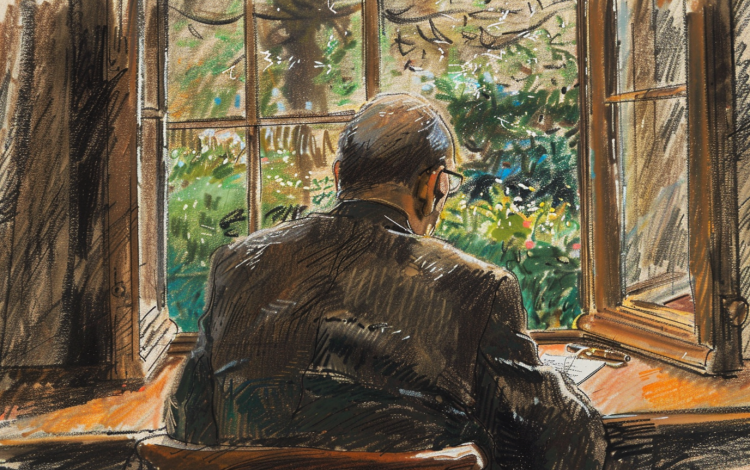
Credits: Der Briefschreiber - Midjourney AI
You could think ...
An - admittedly - silly thought: although I was busy with Simenon all week, there was no »output«. That makes me feel like I've been lazy. I'm grateful that this doesn't creep up on me when I'm really NOT working on Simenon and Maigret. Simenon hadn't worked on the detective for some time. Then he wrote a letter.
I can't say whether Simenon really wasn't involved with Maigret in the time before he wrote the letter. Actually, that is an impossibility, but at least he wrote in his letter to the retired inspector that they had said goodbye to each other seven years ago. At least he must have thought of him, and he must have taken care of the royalties and rights. I'm pretty sure of that.
The reason for his letter to his old pal Maigret? His birthday. According to legend, the character of the detective had come to his mind fifty years earlier. This is demonstrably part of the realm of legends and fairy tales, but since this legend was not yet so terribly old (about fifteen years), he stuck to it.
The letter was addressed to the Maigrets in Meung-sur-Loire. I know from my own experience that this used to be possible. My aunt once wrote on a postcard: »Oliver Hahn - Westensee«. No zip code, nothing else. In such small towns, the post office obviously takes the trouble to find out the address. After all, people know each other. At least that was the case twenty-five years ago.
On the other hand, Meung-sur-Loire today has around 6,500 inhabitants, so it's not that small. Simenon also didn't know whether the letter would arrive. So he writes:
I don't know if you still live in your little country house in Meung-sur-Loire [...]
A charming euphemism when you don't know whether the recipient is still alive. The question does not arise when a writer writes a letter to his thoroughly fictional character. But Simenon is tender-hearted enough not to rob the reader of the illusion that their hero could still be alive. And that he is doing well!
The Swiss by choice did mention his own age. But that of the Loire pensioner remains unmentioned. Instead, he makes a little fun of himself:
But you were lucky enough not to age for several years after that. It was only at the end of our adventures and our meeting, it seems, that you began to age at the age of fifty-five for a Commissaire Divisionnaire, as you were.
Simenon has thus given us a very realistic assessment of the ageing of men: We only mature up to the age of 55.
Like an old-school gentleman, the author goes into detail about Madame Maigret. If she had existed and had really been allowed to hold the letter in her hands, she would have been moved to read it:
I embrace you with emotion, you and Mrs. Maigret, who probably has no idea that many women envy her, that many men would like to have married a woman like her and that, among other things, a charming Japanese woman plays her role on television, while a Japanese man thinks he is you.
In the letter, Madame's cooking is praised and there is a reference to Courtine and his recipe book.
Then the letter, barely a page long, comes to an end.




